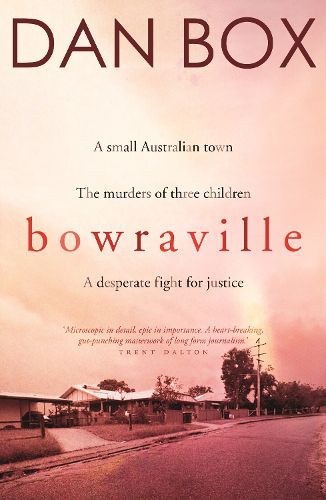Readings Newsletter
Become a Readings Member to make your shopping experience even easier.
Sign in or sign up for free!
You’re not far away from qualifying for FREE standard shipping within Australia
You’ve qualified for FREE standard shipping within Australia
The cart is loading…






$9.00 standard shipping within Australia
FREE standard shipping within Australia for orders over $100.00
Express & International shipping calculated at checkout
Twenty-nine years ago in the tiny, rural NSW town of Bowraville, three Aboriginal children were killed within six months of each other: teenagers Colleen Walker-Craig and Clinton Speedy-Duroux, and four-year-old Evelyn Greenup. One white man was connected to all three murders, but no one was ever convicted for the crimes. Each investigation was unforgivably sloppy in its crucial early days, and the behaviour of the police oftentimes offensive (the officers who firstresponded to Evelyn’s disappearance actually suggested this small child had gone ‘walkabout’). Later, better and fairer cops were put on the case, but irreparable damage had been done. The already-fragile relationship between the police and the families of the victims had been shattered.
Journalist Dan Box learnt about this case from Gary Jubelin, a homicide detective who had worked it. He was shocked by the way this story had faded into obscurity. A serial killer had likely gone free, and nobody cared. Box created a six-part podcast about the murders, and this book is the expansion of that series. While the podcast did come first, and I do highly recommend listening to it, you can read this book as a standalone: it covers the case with both scope and forensic attention to detail.
At one point in the book, Box quotes Michelle Jarratt, aunt of four-year-old Evelyn. She tells him: ‘We are never going to get true justice because we wasn’t accorded the right of a proper investigation and respect, like any other family in Australia’. This comment is sobering, and entirely correct: the racism of the police, the non-Aboriginal community of Bowraville, and various other powers that be surrounding the murders is undeniable.
This book has no neat ending; the victim’s loved ones get no closure. A killer still walks free, despite the campaigning of the families, the hard work of advocates within the justice system, and Box’s efforts to draw the case back into the public eye. But this book is an admirable gesture in acknowledging how these children and their families were wronged, and why we must always strive to do better by the marginalised people in our community.